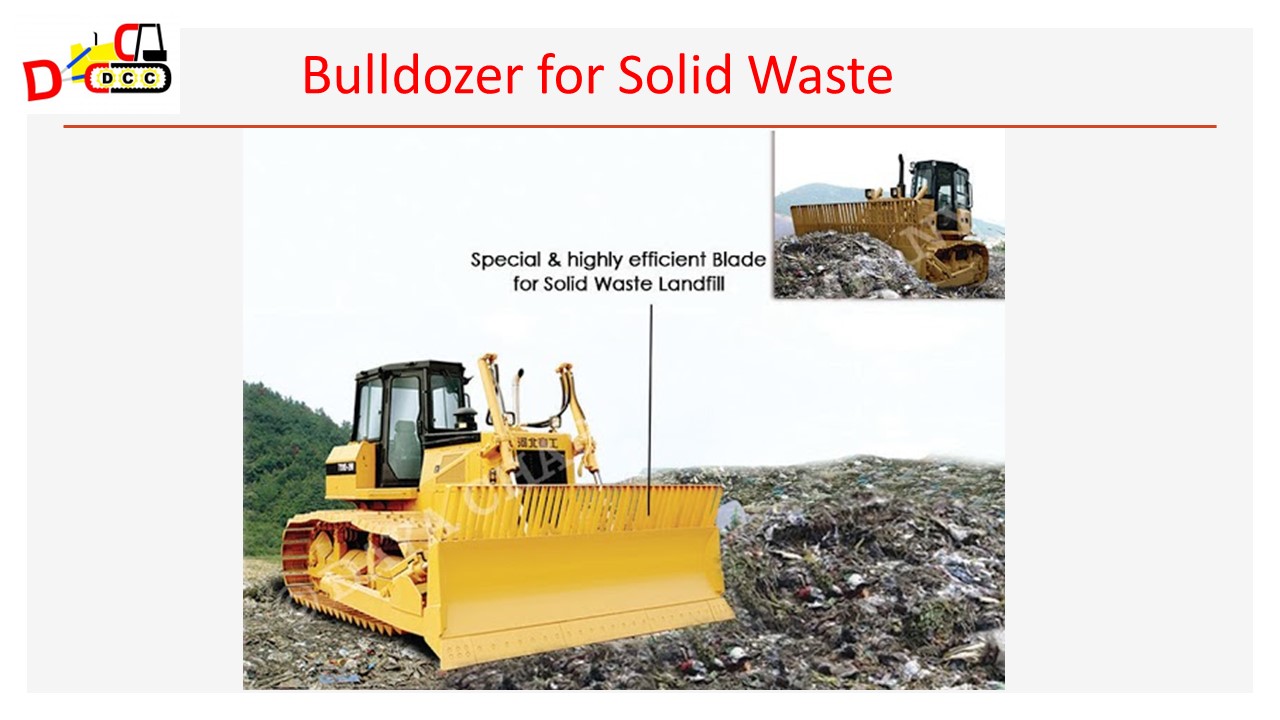Bulldozer for Solid Waste Management - PowerPoint PPT Presentation
Title:
Bulldozer for Solid Waste Management
Description:
A bulldozer compacting solid waste freshly delivered to the MSW landfill site. the new Materials Recycling Facility (MRF) for processing commingled recyclables can also be seen. – PowerPoint PPT presentation
Number of Views:6
Title: Bulldozer for Solid Waste Management
1
Bulldozer for Solid Waste
2
MSW Landfill
3
Triangular Swamp Track Plates
4
Introduction
Solid waste management is a local issue with
global implications. As the worlds population
continues to grow, so does the amount of waste
being produced. As waste generation increases, so
does the importance of having an effective solid
waste management system in place. However, cities
and local governments face many challenges when
it comes to properly manage their solid waste.
The Best Practices for Solid Waste Management
A Guide for Decision-Makers in Developing
Countries (Guide) is focused on best practices
for solid waste management in medium and large
urban centres in developing countries (generally
referred to as cities in the Guide), because
they face the most substantial solid waste
management challenges. Given their waste
generation projections, these challenges will
only become more acute in the future and
decision-makers have the opportunity to take
important and effective action. Portions of the
Guide might also be applicable to rural towns,
villages, or other small jurisdictions. The
Guides primary audience is state and local
government authorities in these cities. These
authorities typically include decision-makers,
policymakers, and agency staff involved in solid
waste management.
5
Why Is Solid Waste Management Important?
Inadequate solid waste management can impact
cities and their residents in myriad ways. These
impacts can generally be categorized into three
categories Human health. The improper
handling of waste can impact human health (e.g.,
decomposing organic waste attracts rodents,
insects, and stray animals). In some cities,
human fecal matter and urine are not separated
from solid waste, which attract insects and germs
that spread disease (e.g., typhoid, cholera).
Mosquitos also pose a concern when they breed in
solid waste (e.g., used tires) mosquitos can be
vectors for diseases such as malaria, dengue, and
the Zika virus. Mismanaged solid waste and open
dumpsites can lead to environmental contamination
of surface and groundwater, which are common
sources of drinking water. Uncontrolled burning
of waste may result in emissions of air
pollutants including dioxins, furans, black
carbon, heavy metals, and particulate matter,
many of which can be toxic for human health (ISWA
2015). For populations living in direct contact
with or close proximity to waste disposal sites,
these health effects can be particularly severe.
For more information on the health risks to
informal sector workers who are exposed to
inadequately managed waste streams, efer to the
Informal Sector Recycling section.
6
Environmental. Inadequate control of leachate,
water that filters through waste and draws out
chemicals, at disposal sites can lead to
environmental contamination of soils and water
bodies, impacting local ecosystems (U.S. EPA
2018d). Mismanaged waste is also a threat to
stray animals and wildlife as animals may try to
consume waste that contains food residue or
scraps. Open burning of waste produces emissions
of black carbon, a component of particulate
matter that has a significant impact on regional
air quality and global climate. Waste disposal
sites release methane, which contributes to the
formation of ground-level ozone. In addition,
methane is a greenhouse gas that contributes to
climate change. For more information on the air
quality and climate change impacts of inadequate
solid waste management, see the Climate and Clean
Air Coalitions Municipal Solid Waste Initiative
website). Socioeconomic. Inadequate solid
waste management can be costly, both in terms of
direct expenses and indirect costs. Mismanaged
solid waste systems are a missed opportunity for
economic growth, including increased property
values and tourism benefits from having clean
streets and beaches. Programs reducing waste can
lead to cost savings in transportation and fuel
costs, and cost recovery if implemented
correctly. Improved solid waste management can
especially benefit highly vulnerable populations
through cost savings on public health systems by
preventing respiratory issues, skin diseases, and
other health care concerns associated with
inadequate solid waste management (ISWA 2015).
7
Thank You for Watching this Presentation!
However, if you are looking New Bulldozer for
Solid Waste work, please Contact Us.
Daya Charan companyJanakpuri, New Delhi -
110058 No - 91-7290049004Email
sales_at_bulldozer.in.comhttps//www.bulldozer.in/b
log/solid-waste-bulldozer-ty165/































